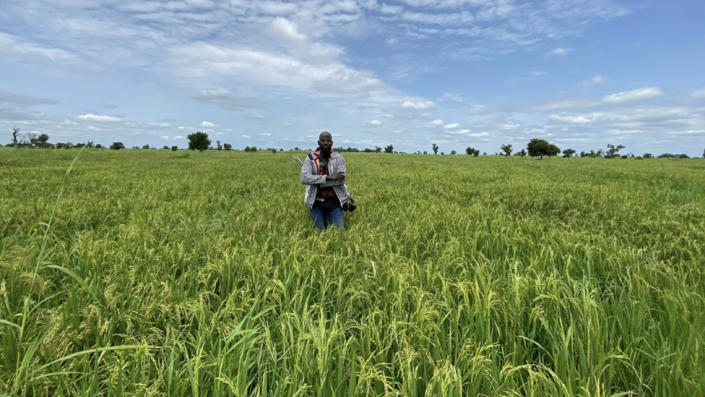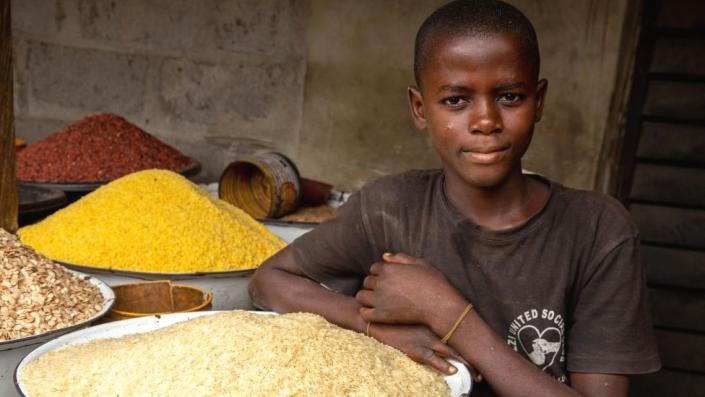
In our series of letters from African journalists, writer and novelist Adaobi Tricia Nwaubani examines why some of those key to boosting agricultural production in Africa’s most populous country are dropping out.

Seven years ago, Rotimi Williams was considered one of Nigeria’s most successful rice farmers, but today the 42-year-old’s land sits idle.
The problem: the insecurity that has paralyzed his farms.
In 2012, Mr Williams quit his banking career and ventured into farming. He has been featured in international media and described as the second largest rice producer in Nigeria, with thriving farms in the north.
But the threat to his life and that of his workers has grown too much.
“There was a time when my car was shot on my way back from the farm,” he said. “There were also kidnapping attempts.
Over the past three years, a sharp rise in insecurity has led gangs to kidnap hundreds of people for ransom in Nigeria, and the staff of successful agricultural enterprises have been particularly targeted, forcing many farms to abandon or close. reduce their activities.
More than 350 farmers have been kidnapped or killed in the 12 months to June 2022 alone, according to a Nigerian security monitoring website.

The majority of the attacks have taken place in the northern region where there are swaths of uncultivated land and some of the largest farms in the country.
In January 2022, five people were killed in an exchange of fire between security guards and armed men on motorcycles, members of gangs known locally as “bandits”, who attacked the premises of GB Foods, a tomato processing plant in the northwest state. of Kebi.
When the multimillion-dollar plant, partly funded by the central bank, was launched to much fanfare in 2020, it was described in the media as the second largest food processing plant in Nigeria and included the largest country tomato farm.
Bandits then tried to kidnap some of the staff. They failed, but the plant has been out of service ever since.
“There is nowhere else in the world where people need armed security to get to the farm,” said Mezuo Nwuneli, the managing partner of Sahel Capital.
His agricultural investment company is in the ninth year of a 10-year contract to invest $66m (£54m) in the agricultural sector on behalf of the government and its partners, including the UK government and some Dutch investors.
In one of Sahel Capital’s farms, a security guard was killed during an attempted kidnapping.
“Before, they were comfortable working until 10 p.m., but because of the attack, they don’t feel safe working late. In other parts of the world, you can run a 24-hour farm. /24 and 7 days a week.”
‘The Green Revolution’
Prior to the discovery of crude oil in 1956, Nigeria was known for a long list of cash crops, such as palm oil, cocoa and groundnuts, but the government’s emphasis on the booming oil sector boom has led to the underdevelopment of non-oil sectors, such as agriculture.
This began to change after Olusegun Obasanjo was elected president in 1999 and pushed to revive agriculture. His government offered farmers better irrigation as well as new machinery and crop varieties to help boost agricultural productivity.

However, the magic really started to happen when the next administration in 2010 appointed the dapper, bowtie-wearing and charismatic Akinwumi Adesina as agriculture minister.
“When Adesina was a minister, he was able to communicate the opportunities of the sector in a way that was exciting to people,” said Mr. Nwuneli, a graduate of Harvard Business School, who launched Sahel Capital in 2010 when he was 35 years.
“At that time, there was a lot of enthusiasm and interest in young people and the many people who were coming into the sector at the same time.”
The following years saw the emergence of many young Nigerian agricultural entrepreneurs, like Mr. Williams and Mr. Nwuneli, in a period that many reports have called Nigeria’s “green revolution”.
“From 1990 to 2010, 20 million young people entered the oversaturated labor force. For us, we are committed to unleashing the power of agriculture and job creation with the goal of creating 10 million jobs in ‘by 2030,” said Kola Masha, another Harvard graduate, who founded Babban Gona, which means “Big Farm” in Hausa, in 2010.
His company uses innovative technology to help its more than 20,000 small-scale maize grower members improve crop yields, reduce production costs and increase selling price.
In 2017, Mr. Adesina, then Director of the African Development Bank, received the World Food Prize “for driving change in African agriculture” and “his breakthrough achievements as Minister of Agriculture “.
“We have lost 300 farms”
All that progress now appears to be collapsing, with nearly 25 million Nigerians at risk of going hungry between June and August 2023, according to the UN.
“We lost about 300 farms,” said Stella Thomas, who in 2011, at the age of 32, founded Techni Seeds. Based in the northwest city of Kano, the company applies scientific research to produce quality seeds which it then distributes to thousands of farmers across Nigeria, overseeing their work from planting to harvest to ensure maximum yield.
“We call them ‘outside growers’. We found that because most farmers use saved seed – they recycle their seed – [then] over time they don’t get enough output. So we give them the seeds they use, and we’re responsible for making sure they’re doing the right thing. »
Insecurity has forced hundreds of its “out growers” to abandon the network of supervised farms.

Mr Williams enjoyed spending months at a stretch on his farm, hosting barbecues for farmers at the end of a hard day’s work, complete with a stereo and loud music.
It is now in the process of shifting its rice production to other West African countries, such as Gambia and Senegal, which also consume rice in large quantities.
His current calculations show that transport costs would make it unprofitable for him to supply Nigeria with rice from these countries, and he predicts that rising food inflation in Nigeria will only get worse – if the government continues to lax in its security management.
“If there is no security, there is no agriculture,” he said. “It’s that simple.”
Bola Ahmed Tinubu was sworn in late last month as the new president succeeding Muhammadu Buhari – and insecurity is his problem to be solved.
“We’re all hopeful that this will be fixed,” Mr Williams said, reflecting on the future, “but we’ll see.”
More letters from Africa:
Follow us on twitter @BBCAfricaon Facebook at BBC Africa or on Instagram at bbcafrica


